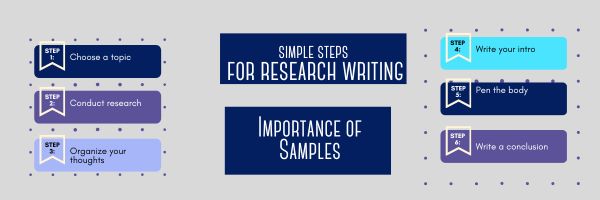This post will introduce you to some quick tips for writing a research paper along with the importance of samples.
Simple Steps for Research Paper Writing and the Importance of Samples
Research papers are academic writings that offer rigorous analysis, evaluation, assessment, and interpretation of a specific topic. They are similar to essays but usually more detailed and longer. The primary purpose of encouraging students to jot down a research paper is to assess their writing and research skills.
Regardless of the course (science, history, or literature), every student has to prepare a research document at some point or the other. Looking for tips to prepare outstanding work? This post will take you through the writing process of a research paper and the importance of samples. Let’s dive into the details.
Main Tips for Research Paper Writing
1. Choose a Topic
The first step in writing a research paper is to pick an assignment topic that interests you. You should select a title you are passionate about. This will help to keep you motivated throughout the drafting phase. Formulating an interesting topic can be difficult without someone else’s help. Check out the free sample essays from PapersOwl, where you’ll find a wide range of ideas from which you can choose the most fascinating one for yourself. Well-written samples from professional services will inspire you to get started.
Additionally, prefer picking topics relevant to your field of study that have not been broadly researched. This is an effective way to ensure you have something unique and new to contribute to the educational community.
2. Conduct Research
Once you select your topic, the next step is to conduct research. You can collect information from various citing sources, including journals, books, articles, and free essays online resources. Also, the sources you use must be credible and reliable. This will help you to support the validity of your study.
3. Organise Your Thoughts
After you have gathered all the necessary information, organise and edit your thoughts to create an outline. This will further help you frame your thesis statement and ensure that you include all the required information. Besides, the paper outline will guarantee that your text follows a logical structure, includes well-supported arguments, and is easy to read.
4. Write Your Introduction
The introduction is an important part of writing your research document as it sets the tone for the entire document. Hence, it should be informative, concise, and engaging. The introduction should give background information on the topic, state your thesis statement, highlight the purpose of the study, and outline the research guidelines and questions.
5. Pen Down the Body of the Paper
The body of the document should contain the main content of your study. Divide this section into subsections—each of which should focus on a specific aspect of the topic. It is vital that each subsection is relevant to the overall topic and that they flow logically from one paragraph to the next.
6. Write the Conclusion
The conclusion is the final section of your research document, and it should summarise your findings and conclusions. Your conclusion should be well-written and must state the implications of your study. Using a free plagiarism checker or other digital tools help you ensure the originality of your work. Also, make sure to check grammar and avoid introducing new information in the conclusion section.
Importance of Samples in the Research Process
Samples are an essential part of the research procedure. They demonstrate that the research is representative of the population being studied. You should know that a sample is a subset of the population and is used to draw conclusions about the population as a whole. There are several ways of choosing samples, including stratified sampling, random sampling, and cluster sampling.
The use of a sample is essential since doing so increases the accuracy and reliability of the results. For example, if you were performing research on the prevalence of a particular disease, it would be impractical and expensive to test the entire population. Instead, you can choose a sample and use the results to estimate the prevalence of the disease in the population.
Conclusion
Writing a research paper requires time, effort, and a methodical approach. You can create impressive and detailed research documents by considering the above information. Pick your topic by taking help from a free essay example, do thorough research to gather material, and do not forget to proofread.
Additionally, the importance of using a sample in your study cannot be overstated. A sample helps ensure that the results are accurate and reliable and the research represents the data being studied. With careful planning, you can produce a high-quality research paper that makes a valuable contribution to the educational community.
Copyright ©2023 askatechteacher.com – All rights reserved.
Here’s the sign-up link if the image above doesn’t work:
https://forms.aweber.com/form/07/1910174607.htm
Jacqui Murray has been teaching K-18 technology for 30 years. She is the editor/author of over a hundred tech ed resources including a K-12 technology curriculum, K-8 keyboard curriculum, K-8 Digital Citizenship curriculum. She is an adjunct professor in tech ed, Master Teacher, webmaster for four blogs, an Amazon Vine Voice, CSTA presentation reviewer, freelance journalist on tech ed topics, contributor to NEA Today, and author of the tech thrillers, To Hunt a Sub and Twenty-four Days. You can find her resources at Structured Learning.






































As a PhD student (Robotics / Artificial Intelligence and Control Systems) I wrote several papers for journals and conferences. At the time my English was not that great, and my Advisor had to go through and correct a lot of grammar. He said Swedish must be like German because that’s what it looks like. At first, I did not pay much attention to the writing because the research, the algorithms, and the references, were the important parts, and he would correct it anyway. However, I learned that the quality of the writing is important for the presentation of the paper, and it partially determines how often it will get referenced.
I love those PhD topics, right up my interests.